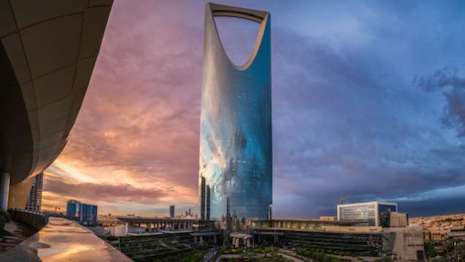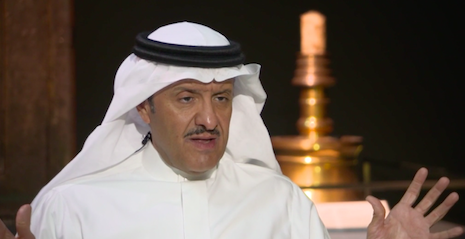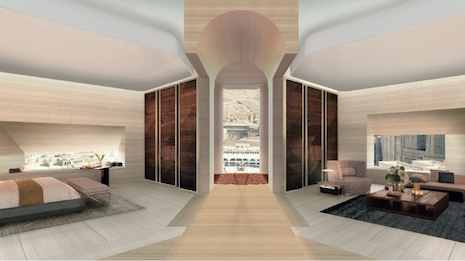As affluent travelers continue to look for destinations that many others have not been, Saudi Arabia’s tourist visa announcement will likely attract the luxury vacationer.
While Saudi Arabia has been open to business travel and religious pilgrimages, visiting for pleasure has never been an option. But now the Middle Eastern destination will be opened up to tourists through a new visa that extends to leisure travelers, likely attracting affluents who seek out unique spots and true cultural experiences.
“There is clearly a segment of the luxury market that is interested in middle eastern destinations - you only need to look at the growth of travel to UAE to see that,” said Taylor Rains, managing partner at Flugel Consulting. “What Saudi Arabia offers, though, is a purer cultural experience.
“Travelers looking for history, culture and a unique experience are likely to be interested in exploring new opportunities in the region,” he said.
Unseen experiences
Saudi Arabia's decision to welcome leisure travelers will attract visitors outside of the Middle East in a manner similar to when Cuba’s borders opened to United States travelers.
When the U.S. government's travel ban to Cuba lifted, the island nation quickly climbed into the top 15 of desired destinations among affluent American travelers, according to a luxury survey conducted by Travel Leaders Group.
The Caribbean country was a destination previously unseen by many U.S. travelers due to the past travel restrictions imposed by the government, but many affluent travelers have flocked to Cuba now due to the exclusivity (see more).
Since Saudi Arabia has not had previous experience with excessive tourism, visiting the country will mean a true authentic cultural experience. Many destinations that see a flurry of leisure visitors will accrue touristy traps that turn off affluent travelers, but Saudi Arabia’s lack of vacationers have kept it a cultural mine.
The country is already home to a series of five-star hotels including locations from brands such as Four Season, Ritz-Carlton, Rosewood and InterContinental. But top locations such as the Holy City of Makkah, also known as Mecca, Jeddah and Saudi Arabia's capital of Riyadh will likely see an increased presence from additional luxury brands and hoteliers after the visa is instated.
In October, Four Seasons announced a second property in Saudi Arabia.

our Seasons Hotel Makkah will join Four Seasons' Riyadh property (pictured). Image credit: Four Seasons
The hospitality brand currently operates a property in Riyadh and will add a hotel in Mecca, through a development partnership with Jabal Omar Development Company (JODC). Due to the new Four Seasons’ adjacency to the Al-Masjid Al-Ḥarām, or Grand Mosque, the hotel is likely to be of interest to affluent Muslims visiting the Holy City (see story).
For instance, a series of resorts across the Red Sea will be opening in the near future.
Tourist trap
While Saudi Arabia is not currently a touristy area, this could change within the next couple of years after the visa is out. U.S. theme park brand Six Flags is already working with Dubai Parks and Resorts DUBA.DU to build a series of amusement parks in Saudi Arabia.
The destination's future theme parks and increase of luxury brands are a few initiatives that will hope to position its image as a luxury hub to compete with Dubai and Abu Dhabi, United Arab Emirates, cities known as top luxury locations in the Middle Eastern region due to the prevalence of high-end shopping, automobiles, hotels and residential properties.
Reports have also noted that the country is looking to develop more entertainment to help support its economy. However, experts have noted that the future the country looks for could be complicated, as Saudi Arabia is known for its strict guidelines on women’s clothing and gender segregation.
Women have only just recently been given the right to drive, but Crown Prince Mohammed bin Salman has been making continual strides similar to these to adhere to a more “modern Islam.”
The Crown Prince originally announced he was looking to overhaul the economy in Saudi Arabia, to help its dependence on oil. These new policies will start to take effect this year, which includes women being able to drive (see story).
Saudi Arabia's Crown Prince will also allow commercial movie theaters to start to open up, as well as allowing women into major sports stadiums to better accommodate families.
In an interview with CNNMoney, the Crown Prince stressed that with these changes he is hoping to see 30 million visitors a year by 2030, an increase of 12 million.

CNNMoney interviews the Saudi Arabian Crown Prince. Image credit: CNNMoney
In 2016, Saudi Arabia saw a total of 18 million visitors, most of which are a part of Hajj, an annual pilgrimage to Mecca and the Grand Mosque. The journey to Mecca is to be taken at least once by every adult Muslim, which is regarded as Islam's most holy city.
Travel increase
The inclusion of a tourist visa in the hopes to attract affluent travelers might come at a good time for Saudi Arabia. While 2017 was a solid year for luxury, 2018 is projected to see slight increases to total spending, with most of the growth coming from travel-related purchases.
This data comes from Luxury Institute’s annual study on the state of the luxury business, which surveyed thousands of affluent customers from the wealthiest nations in the world. The data supports the growing understanding that luxury consumers are beginning to value experiences over products (see more).
“This step by Saudi Arabia could be indicative of a turning tide in the tourism industry,” Flugel Consulting’s Mr. Rains said. “A handful of middle eastern nations have maintained a tight control over tourism in the country, Saudi Arabia being one of the most notable.
“In effect, this region has been a last frontier for luxury travel,” he said. “With Saudi Arabia loosening restrictions on travel, it's possible other nations in the region will follow suit.
“The infrastructure for luxury travel in these countries is already in place, it's just a matter of access. With that access permitted, I imagine there will be a large influx of luxury tourists, particularly those interested in cultural and experiential travel, planning trips to the middle east.”
{"ct":"RNjtWxrFmt4c8+4y3kYx+6fwa9\/jDy823S3bNzg01udR3SbQgT\/pBn4is4\/WX6DG67AbA39yeVKylZ0rvcgK4cacMLdDtnVA0nK5A7O6q7ebOdN0oVVx3PJfUM0SSz8sJf5etxlnhqMUsI2AgSPCxM3l7KMCD1rixHYD3SR9yF2AN+5Rtidm9TcR5Ed\/4nTPvNEY2lXpp+Cyo3w8yv+5EFt0sQcXSWEakdXgDilHEuzkZEvFV\/nL2I5tifVNpSKpmfqLjiEeXvBw8IU8wBFSzRggboxyOVaYIspOraUOMzHctCQtdbMu\/ejvoLSQX9zFkD2SVhEVfo1LIdlnF3WZ3AbsXYTX9YCAzmYDm4WWPqZ+56hUJ7pK0iDLFbLhhKhVJ64+N78iHQOPRk4owRnasYsoTMAQ1KqUBhHaWFRgMj4A38lKuzJnPRPwOBKuFr3aIlwdneRqSahMfBzpm7TtyhJygPxZSEpJFdRAU2qaQILCmYp13CtRDsCskJcLRmUbZ\/pDuemOwrijVW9olFuHPnqyKy0Ex2HuKqWnnDxNo5ujA0v7jabuiIKkg9EwYmkWMJJTokrJcbPmbnexxkDY7USgGAr5ATqhaVMX1UcxY+9LU51z4Z02CEDJ6ZQDwbBMWlftKjti6EC+dbmdTNLk9SxvFX6BK7iUkmJNvZhE4FgaN8EghQ3IiFtU4HNiw4rTxbT2Xt\/Z2PgL1G5rulAfS80G4\/s2AbhS\/pd9bbGG4vUedMBxR481a3lmEIrRxhZeV4qKhTuqYtwsENLAsguVGWD62SvgwhTT08yI\/9YSFSbo40JvpMG6E4ChqEvU1GjKbE5eJUqO+jeVcrR1cFhBBRGKL2nhFP4ffHVpe\/BAmuH2+DqDIv0GBeC4iWHZNaHV+Z9nrew\/a0E2bkm13wFMoCBXDMYq4lQ3PFZVoqUa6AAaF9UevkMi\/vm8DZMFAQ8UVSOBK1ubut\/qaQHr53+X\/2IlNHhW13dka3+UwTIXW4yvJqxHdX3dfWYJqT9Nipe4MIv0av\/leDVmpsgpJ5zHxkrCc1y2XmJWsl5FqsweJUBCvj80Bc+fGQ8WXyO+OLd76A1rnZHJ8H0QbB5ted6PchWL4Bdtu054dp2ae552eM\/81mlDutpKIrHfB+I2yzYQBlPp8msKfhWDRg9TURpgJgCRo6mjAjzO5I0qkiG6sZoXsQmd4tDfUXiIwfcwEJvzOraQCqW1q0K4dn\/a4uPsJ\/IJt2Iih3AY0FhjOKKEyUYv6x6rGDp6fMIhiPiPvHqL6jqxVuSy8482NwsXopEXIML24CYK+9yO77lE36XFyOCcGfZlgNZfv7qfIRVJ5EMeSNdotgaov9suSedwslkCez9hh31mpWCU7VEegXYedL0JjmHZ7QRalegyoHIAieG2yposvkz7V4NeorVfTqA7b9oMn1S8Dzcx0c0OKJOUD98Y5yTW+9pxHbKYLSi1kSg6RzoX24Kqo4seFV0jC3tpEcNMaN\/WjaHKXDNysVU8GM12LREQ7Lw+yk+Q300vZ2KXgM1wL0Cj0+OKqPe+gv0J9iidEHgnp5libZzrIFPCXYLxq4s4BbDUa12gTUSNsfbqLOrYIQn32h507HMvCydCn4ovxZ3dBen4ufLKZC\/emGAh265YqIQyuloHtTOd34oYSg9N1JtN8xfcoG8marHfHyed21rvKHWuxOJZ83AjKZkhAHrWXC1dLEKrCvhc+i\/B3zZFn2PNKlAqPORsw91VzRRHepDovAih1Ba4zqkN8HJefM1JpV+61mV4libxgG\/yU\/8p3x4MpMQCTJJrB+atlAPzg4fM2fTz6ovd8S7mBTIaqzdL7bYVaroQ9c5iB4JMK+Q1k7oKapenhsZAujbC\/wT7ckrOhn3VtrplAYNC46yX158I6IHP3rrNSI8Vrgp9oagurbYUKseWe7dyhNsFBInF+xGekdGfjaYc5eqNFYwjl6qBKX6H9\/suujtyKIFDunSy7o5k4IW7BZzCh6+vf4fCPtfufBP\/tdqPzdml8G6GmzXvCfWZ0emvJa09QMZwWF7FQ6uAFXe8vgg6Z2tEKkELZpBKCK3F2lryNe355Ob8aCiv0+2pcfdinYxlL1P\/ClM14IjOI2bB1bgZWdosVShUr7eW0omdJ50AFz++NZXSmlitZWsXHDVedbcy7dYrtHT\/yWg+IOTsKaFIy\/Z0qnG+Eum8V2tjllnLsayvyCW45QTePxhWgvICOW1n6N6F6TMDMAbA1i92cnROxiZU8h5R4UU4Krj2\/3jkSnPnwLFZas1JBwwBZboz5GbCLtgWmLz\/ClfV\/las1oXZYSPO0+HY9daIqM0Dm2RL\/N8XQHvh6Yb9E0lyANJbQS5U6G1cHUv5aM3X4flPt2b8mwVl4mI\/pgay679BWdQf1eKZKCB8n6KVqNm\/75GvMtdEZWOymyBCgiqjf\/\/gzp894r+DuFAnAshr+svJHTImdq\/LOcsD6q+MbLHPyrE34bd5KDrPI2OGebJrqa2eqNjtEjIzcsm9rVjY4BtGkJFM\/LnoqaUZaXWbwU6R4Io60hJjMw\/bLHy\/5SnpcWedSjPe76g4DEg9ziRMPS+Igi3PsEPNDj5Qfup4lhVCNCh04bvpsFfXd847k1WBNI1+x7krcxOmo5h6SSEFFq9UV4uoKW\/CNMaXcVW+oIKPuIPcso\/rcP\/5PsPTSns9czbupVeWgnl0cXAEYof82PKgdW+3rABk6GF+aSsIQ0CCw6k5GNcFoKs0mPH5SUiBRyQNkwwh2MbjRDzNomyzcllQwuNe\/Zg5u2b4LFquZyeRYMMy93H3BDrJXyEiANuQtCoyTFRS5yBQpyZY23qG\/s8wORFCXUsFmUX+NR0PXTH3wZ5oLuwVk4Kjbw2QT9nPVX\/3WI+8UcLL5lMvJKGvG1DX3KilceMo\/QF3QduUYMYKlEQbfa+\/Itfu8BYK94RDEVijZ4dP\/R3mSfUhcxyWEIo3BhujIaGan1JnSSmcf8hl76Z60XXSlUmfWUCrr1BqRCQMnB4f48ITLbPS8xBmERvGR\/PbRgu3EcwjxFujDmwxwk4v5WQgraNPrIwB9JPoMG0\/v5\/Pr0qd8x8w2sEEUS4+bRSPFQmeM62mUniMyY0SSAHvUm2ggTKywOFBKchDe70RfsP8Iijby0eBmQUCg81SqgqaTzCzy0SdeVqARv7l7Ijsbp89sUm2r\/HaCCmiOecFWEpNOhCiquHS0ldEScRn41nUBu9+ckEbDug2639GMEGT34zCkJPlaQ8\/chNGKQPMuzc02pQOyn3OfkJ+ypmLu+hL2xiYnFVbL1paEEEz4GGfzg90CfCy+S\/qxZqPXhprQW6UvjWUeggiLJstZqGTfNMwZk\/gYWRX1+WVRYdBPm0jIQBK5Or+JS4nMZrnNxMZpnWY0HCgNfTNvjAQd1Rc19yOz7A6p7bwdHlazARXcEht4DbgmGvqogtdNgREuw4Skc4eWhWXzAoMATK9U8EoeVkHVZrrQHZWLcf1z\/\/HYHqLdg0a3yM\/H1W5w0FeUYNuFOJjh8uPNZGohwjerRI+kwHAF76ke57GxIlqXiNDg8KZ7lDY+b7luOAmg6X7R+tLT+JzftTGiCR3DoL8ZNFU7NVMmlu4+GZqPqEZy\/t2w\/V3R8KtGShFGGpxMyfnwzWQPVnNLAWxz4ZroJPndNbS\/YmQY3k4CHitYM\/JedjEWE6XvNW2aNn5pEXuPCmFi8fEkpqLsH1zdX+HuaUeI8N530fOiSrnyRhPxg9Q6tHO6\/2xFr5wzqc7ctJDYy\/pnKF7T4AEUMCcekEsRVrdd7hRP6a6eoXFZvbXkhUjpjm6DboaPVIGL4TQ49Wjb8CU69wCizzQ1aA7ckyH3MF0376Lbiz4LGYZYZJ+wBXDAhMyivInnW1yCthBroxE2Zb1YvhG456ZwpbSf7Fmp9s\/q4p0mcdgYqs\/RiR90VACsiAI4MSGH3b7Dc5GSimiL9DgF+W3lpoN569EcLMAubS5bx9w10Zv0ZMUAu2WIOArhccFqPyttEJ\/vi89+HQHZmm0ruuARZVSmiEyPJ4O\/4UTToys5DyfSi+NgtAzIV1yNfP3nAVRmWbfdOPWJzI4uOzDLwvBN3ZmV3\/2FmoSvMfjgjTOCsdqDHTdEQNzGtUGh3+udcdEhnNOJXp83e4q9mtDnXBHNNoiQrNHPWZB00LgQlyWnSJlmphcM5sn1byjL1WCOibPqsEDcvIPRDsx+mZ6ZPgBRDZNRF+4bVgOxXx45PDOaJ47GtVFavS\/rxO4Ne1pvx1eaxIgbww\/8PijPIb927l4BusASAn1ysJgdCTh4HCgxTJlUFUHjVffiQ5e4XOGDWgVyHjk+j+zcibtJLrs+HkScBf3jqB+SKc5RCKr\/P1iJOMcBDe7UOqZwG6CyoJiod\/SFtkCZ2h0qVC4II5NL7X8Q3gOule7wT2+RVpOi7gqTWN42DasHlopT2zFLtvWlJeQE8GF7ON9V7MTuDNwrkKtDQpw1mlaMy6521c\/mf+WpGzurwTSUBCbD8R3s5ffesTRu8frASyE5JInMi3fZs9vjq0bhhdgZYcUtguy9fJd+hlbrwAg7ZO6Hc+piVNci\/rCj5CTyfLlmmXB6VBnDUBy3UG02K5RoiYJTvBNBecp8\/So7mw7Qpv5SrMbuijU7dM9b3G9U1cKE7Yr+n7W\/KTlw1U8BD6b\/aO7CopsbNN\/5G4tuiHw9+KXIWSovoL23JS1\/9FL9HDG18zEi0VRj1OXs7YlpZ5nlhFGaZ2BgI9lWoNpjA6dYYjVcLpcE8xOMjc+Pp4euRtVcdpiYqvjmupchptc4nq9h8NJjtVJjv+Lnmt8m9x8ud5J5N8viIhT5URTk1Xjdj7hStDOQw5lnNWs4HQ5sxhF5nlLM40pwd0foIsSpp7aSltChLogfHYMf9SI9IoNVWGWY6UoExJlaO210ZPSmgjHrGVws3GZb2088jhYd3bJYkJXvc1UkDtzHrfCTSLskMaW3LUJPRp0A6Rbnrst0pohAT5vfzwarr44ARNBuq7rAXuNiXiRJ2+r6rIeqlbQyWQ8PUPNHEpvvsVlNz3nNmHfdAoJeMCzUx5OVj3h8M1FKDE0eb3xruMTVq9jlKVDDxXDTASNPMdDHioPjfgvZNA3W30p0+o5NqlTMpwB4tORe6jLoYxrp\/nxKPqNd0\/EGZ\/wrwDM3wAnYbQn9M54jLhEzmR3UKOP8oxXaqJWh\/13DsPg0\/rmXWLz0tIxLR0RVcY0qTESaTvVurc6BBhFQzJuSJbpbkumI3a\/YZcyTbTCn6ZTuW2kiXKDx5Ixt+OVdiETZSA5lU9Y77BzhVTiyOiiiyBMhyqh6VSElQFBzpo0t\/aN+iA7HTOvLLlIbSMvAOOeeDeytThKnv1xs3RFzwTb+\/zVzr\/Wsb74LeyMIOxjjvIC0mQD8iBlkJhi7GviiuORn2phfTF5zVx2MV+jlA2NoJl6a56ltyTHXynzaCaqHc3GPyfnSXUMIk5geUNh\/O47W1F1QawkXmo2UQa2g\/qxKtVjVXnDsbWuZgzHWpIftUhHM3NsxtYJkUeMwdNVWRC0tYARBfwpU6gLsIKcfJo5VM76hNhRDpVCyeR65t4OUnia8Dvm5a+f6K2kx29KQDglQ+IZsZRDIph6k3xp9tSU0tK0tFNAnvGYsDlxAcSn+f\/2+y7FZ1GeTY8jkAYhCgnWvQUahhUpeNzRmfUa0Lf6Qca0JL3mUuPrirkw324ih+bQPoPzhbxoMUmML59kFpYuKnAGWsKtvnxnN8tErZlfee333U3cqecdhIYQMyX0Zz+boEiVIWzsStFKT4T0\/56rRmorl0O9er3fBMXrYt6qU0LRJ2MQS\/2shHKterP\/e4WMwrw\/+oC0he3fwmS1CHcG5URxCRqoj8hkykche25FXl7qMK0lJIgv06575j68LQh4rfgLrCzzhKD0dAmRB\/w4K1tSQFvSSJSigwIAPx5zPw6wd53uhaNP88rboXoyEFkBpZoNPkee+Aoqp+vzPNgKzITr4GfbT2S6PwhpY\/AfwNeLVYch0KXCFj9JbBSxouD44vgz1i7q8Sj\/tCKrr5tSE2G\/kBdk0ZM4eZHVgwmXMeBlYfUJyhneM+bD9J1WcXDAdyTZKJJegebu511k6Rxmmf7J7\/SPHlVKdSj+r4tMULPxGbbdt0A3EqpYWLJXEiIApd6kcxff3dqXHHxXD44qqvqxM254tReIM4X78jQOlIWDPo6RgB7alF6Wdtb8qEYmXRyoGJ6lEUkFQioZp+hi7ozYDm5ozjeFNaD9VPmKOjfonmvxnuFukV9ijrdu7pS9ZnCF4RpTiPxD+4BKLK7YcfD66GDUUU2c+DIzA9IC5Ja4Tr8z7H1fuykCIm6nxcra5c9O9d0v4oTWMGZq2Mfj\/+7QNoSWbFs6jHWqVMRr6Qm94QWJPVF9YcpRR6tz7dD\/TFWn5fsUCePdxvzSv5xbBaVRd6YGrmxnUhPu1dzIk0czg5q9BCJhn0k0RxdPtEAqFwjbIYOqSDWgL0TML++wr5c+jxNJ6n9vKOZsGq9Wjs3YEWlG0IX6p2eqhy7NbrRiBJBMICD+v8IyJymKy6y6qNR6Q95LI8xpSSRsJe7yHzrgWD6+sxyvTdY4UPN7JYGmC4IJhpPXeDp6q0fwQsmdKwQzEkLTszuan2nepsMue66NltgnrPenxTdMJyc6eAT08tMUpYV3jRLVYx\/VHiMLCINaK9TgCQyY2nOQBg0C6nvGZXGM3sencgdpyJhMAxEQ1FZsQecebwTkyHC2TXjc9mIdBICQ2etRwL7f3chbKHx4uNP74xcVujcRNWpkB2se3lvGW\/pfynqIwqy5nitBDgkz5t1d302+M0BXzbFsXPTdBrkpHsqLp1+rl+xLmf9u2PM3his0vr\/cCRh8mQjy0ILbIMLl7RSVux7xbiSzXGSG7Ft+Y0lPLeN+IAtpVmB4ohCPRJEpFe2cj2UBRGX9Dkb9mvZL9ivit0impiZk6HwEjsw\/3kAiIA5a2aSSeegUW2TP\/6H7lztotREe3Ckkj0If+2A3DHdQO+tsxkAXG5JFOkXiRPIo9V8KEt+HFqfWU+Mf8e99CEcgnCkokG+kBUo2coA\/Th9Y5sMIH6fqZ\/i8UOFgndKs5pGtLLn3ECzoS3K5135Gf36mIL\/lD94ftO5HBJPZcFY08AVnKsxbSxBRpf1w4wqO96UZihRnXUQXYyVUaOVYWa4XAAngFe4UcvAY5jPdSEQvJbxLqIraJ6uYCSelaiW1fttv0qRB3Rl7REVX073rzE\/GsitcvCmZjhNmK7L9Jf5JgqFGzgrnFWjiSXoSRyEONqk8kdcXLPb8ykK3rPnmVK\/fvluKfro+Edn3OjGehAV1JOKUo1nwlSLgYJk63LqNMz\/b2JMTSkIQNeWs7P7PHEfbpV9tSws86SFNNDCJIiaK6Hxp4M7Ak+9sE5HSdjoPMft9TiaSoTtJRky08WJbJ\/jxbb+8dIBJ9oRVB\/frN\/Ac8DlIxglTgrO4UGstKzJGKSlkPtQdC8TNCh3vyLXe3316uQKvNGuO2VvG5Yw0pG5Eq+s\/syy0UX+V9Lk81\/E5s2KY5eZiosu9jhpUWDcO\/7XwZfkXSqeP+dawsq6hcjFdG2DzFWG8mKrVVN6mayiyxboZRYlZ2E9kTVU5QkfaeOMZgd9jUtaB0YlRFmBnnnQD8zUvgzW8dHx9FAIek6yzB4NEmlqgmeFukz\/WOieg5x+\/unynXqKczIruQ4NUjK9cLv4RMVRcCG45e0+ENQGF1bKZbBQMJB3Tmry3Tox0OZEEfNf0vWyRow59aqpc0yD5c7Qjzpdny8OmJ4Zw3W+W89usYfUHaBgBiU3H7wS+UqMwwIX\/jtEf6SJ+6UjGWzi\/95N87ECiEZU8zZHDHEfXZXo2xhwUR7wbZglJlSaczKgBi1aRDdKYsYOouVj87P9ojNJl+UHCK3FaQIwxV6DIWYPSx\/dSyjsNYv0UkPrsMQly4f635M6xgyUzH7BORPH7xHOP1+w3nY0PUdoLFTHm614t5ynZmQ9SWA+LEaumPGQJ1S8RDaVNc5VkSFHqdcPLov7LW1SW2yZ4ZpzuUL9h3KHkXJFLvI974PKDKQGqFmc9\/84XJp9OykBBfRdpsA5BM\/67xvXaJgYk4shd2x8pSo7hL3ccZKRwNelXMVkoMd\/jxUMuJgoMB+2orV7tT1B7Av4qNp\/4yto2LEM3QqNkt+pXzjLFim3asNjNUGy\/3K+TgB0gLBMw2Enc3LGkstOPOeQnKlavQUFcA33NciOm4rKDZqNCvQs56wJiefO9T5p3u+cjxrTIkOIS4GGTWCiCzpUBuyGMXm0479Z6dYtqJ2Ln+ZpjZ2KaYO5dAIT83FrahPA3SONkWSWZJM+5HaXPn8AnUdkWUDWoyoFf1jDjxi51l\/7NtggQmrRjN1gmCXvvk8lG2vvJ5BOFZ3F6KxNT8zMBQbPzXe6YVLmoIk4aqXzsgRfEB0vjtW1NUIS0RuaVUL3HVSRdPH\/cNPAh9frdJVng1B+RsDNr2wyP7A+vV5pK\/VWoav5s0BzYQld1pSJnd3nQMZ3NFZwQ8KphHWtEmfIp4T0QIrjUGf7iiBtoWjUqOrWP4zom21xn1H4gm5OHQlDvQ7WkGNUoHE8\/dbrclZNGi\/\/Jhkf9w+cTaWvXFtsYsEzbEN0Zfqx0Bb1Pn2bJwLQzFj80HnplZ9VJ59\/VAnXMjKl51nzvWkplcZ\/pRy56pJlh1ffpPBW3IPzO5Wtatw6cd2xWilAmXpl+kgWN8rysT7gIPE+7eH0bA7HguTw8JdjreXj2Kls\/fbmaXaD8TQHXzDUDFZJnZAvzKuWh5FuoaDabBOReMom8xKkQ6kZm5nV6Rn2i0+5Tsx60UIfFvEt+8DS0+tepe2KYiya16tpzHUwDmtZgHavDz5ohdkzrmDYf5f7A19AiHTSJYSWXDUQ1qREKCpLQ2Imjs\/RnPeQZ0z1TuuzKvi0oq\/GQP1lrZpFjayGIpMw2G7OtLCmumZ18MtPdtaktNtbp\/PxtxSlcvqV4eFo+wEPvdhut87bsuc1FAaPJiWsNAf8MvH5oAR8F2t1K1o1vTl20FbEL65f3eJK3MEaLN4w6noiNg\/R\/ImA1y5dwAiTRhcYM9NIujUkWbecpah6PQOlqbcRZueIhzXO5yH\/81v+zkjRJqKZiBCbi471IslwYKDRI2E\/SnAynyAa0VR0Z9oXOX++ev6Rps+v0dOBhBjrxXgSLc\/yLbT9cRs+apNdx3aqinEg9mflS1vtiQA2Thim1JLtJ10L9o\/cpWjhMBusxExN6\/k5tvjHDWirLTlPXgCcCTfjkig2qCkJfOaDQkbWjcKeN3EwCO01w3GUYrvs+XBytOVGb\/h9ZEV+wv8fKZ69IXkOwGe9YqxaIA2ptZ6A49nj9PqyI47WQZdGMZ4eShe6BBqwMQcCdN3rfTr4K6IucQ0EZfKPTcpgNOD0XUFMDss3G+WrBG+t6nUbtmD3rOZur4cirWikPkSZ47viFoc2j1l6ddxD8H\/PsbtIFMwljs78TovTXyCmXuYhmUnfT8fooDl0zlWPEfQkRkbW7sNQRM+EwJTVE2JI2eXJDnjITzJewpDLe4F1ZGK3z9y7iuwcHkIftBPKxIefCJVZQA6+CrF9l3u0dwNMXmevSHMZL26WkswYqKFWDpPyIva1YcPfgVB6HjhadgDF0Hur3ba7xoC1MT1vrABS5C4JVdnZPD9ACnv+yW5KowUtT6itAL4AJQHIC4N328Fe357TohxPuVU5ggETtrzK54At0tq3fjvDZgy2u0XAxgOdCgg9PkXP93CCv5tQIDUSVmMxq5MWIVKPZK1teWI5hidrY+1wojP0oy1C+Yr41YL\/BxdUbaOEuydbCTIHmn1hoWLNuVN1RcefN4SlnLLA0vW9z1BQSvvunLPkc+rpjSrRMHBBDr8C7d2mTfUjFt0qi4T0txxVAZ2dduVzyPX4KvyiS\/rEB5s78SqLVvNuJh\/UJlfgAAG9TH9+aFrHnBcuTkLR\/bCycGnhY\/rJxOO9BIo\/Qx9nbTaAN\/\/I39Hl+E7pd9ENzKpese03PK1lWZEMdqEn0iet+fX8Yy6fygVTxk4iGtoH+E3c+DNrS7ypwFtbgu9D7\/ikqpbmhAs8rxZjR3VePAW1rAB06kHePrcmCmV\/4kkPosNMdilgVo2bAg6S04haqiFtYc\/VzyJJA7Qs4c9Xo8tXK8WXzoMb6ValwxMIOG1mXgMjgFMnrq83Zbi\/q6u+upPCC3b6G+dSb0eu6ZELNxjLbq+wZo+k+8ERiuB\/bMa22YhazjPcFLAX\/1hsy6OBE9lNAUy0\/py\/1Ha+QCS2mNUE49CBVI35gtizXcnY89lpET2Z8Pb1zdYF5NFYFOUIdWSwfJsMpCdNUvjyyGyfNeSWnEleQ8O0Ygmoo93wLsEEIuGyf1Y9\/STLrIIamx9v7VAmfMxHVwIPzd5FQghX663k9Wt3lidukWbg1beHEW1OuOZxAURQw8VZVCLGOUaKmy5kegQDM0i+DvBirPU5cDhHgujEPEQmb5gbejdHrLc9Fa+qfpC0+rPkC5pBOn9sSe91sXwaKt3K9CjePChcBc0NcXLbzQ8guQGx\/cN35TvJpTvMLFhkyjpalaZiZCdUbFVPZSrtQeGMZysV8tYQm3tAzUwrnrIHKV1PDWtLePXMAwcUfGbqCoMT1kdxZaEMxtPZVCboJSHI1mSXb8HWovs7KpjGyZNh8Vt32tZ+OI0pba+OWFt8qm3whbHfW3s3J4Rj8YcsBS3DY0UrS2iNl6SEhHkgz9txVgt+q4rtDkkJF2nkh80r4iemIPva5OYJnrfBpbXlgJa3\/DP3xYRX+ImRPGQBxEgkCFeQmsyTE0bvlg4D85JMGhtZjicwejQ2nB1VtYetwM+TrjuUNBgB4qABBUI2u5ROL4qed3MGN0IaNrmBmf2J9OaMArwFzB9PMhc7MWeto6uGLTJVFRhPOkQ+uoi1HZ3fIbo2l28\/IFzNy8RsnakiWahj1MlCsVArWAiJvfIKPvm3M54o=","iv":"8aa6db98c56f2d62b004fd85125eef1f","s":"57eb2eb230fc4f9f"}

 Four Seasons looks to open new location in Saudi Arabia amongst news of tourist visa. Image credit: Four Seasons
Four Seasons looks to open new location in Saudi Arabia amongst news of tourist visa. Image credit: Four Seasons